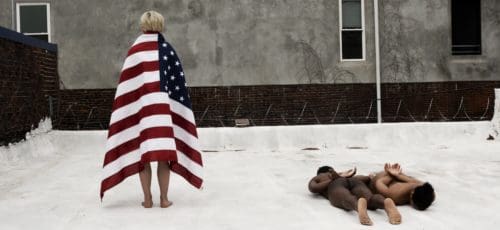Race, Class, and the Subway: “Dutch Masters”
 Regardless of people’s individual feelings on the state of race relations in America, whenever we hear the “n” word spoken out loud, we seem to obsess over the mouth that speaks it and the context in which it is spoken. In Greg Keller’s play Dutch Masters, brought to the 2013 Fringe Festival by Azuka Theatre, the “n” word comes in the very first sentence and continues to be used throughout the dialogue between the play’s two characters, both young men about the same age who meet on a New York City subway in 1992. One white, one black, the characterization and setting might suggest that the play itself is about race, but it’s not. Its essence delves much deeper than the color of its characters’ skin.
Regardless of people’s individual feelings on the state of race relations in America, whenever we hear the “n” word spoken out loud, we seem to obsess over the mouth that speaks it and the context in which it is spoken. In Greg Keller’s play Dutch Masters, brought to the 2013 Fringe Festival by Azuka Theatre, the “n” word comes in the very first sentence and continues to be used throughout the dialogue between the play’s two characters, both young men about the same age who meet on a New York City subway in 1992. One white, one black, the characterization and setting might suggest that the play itself is about race, but it’s not. Its essence delves much deeper than the color of its characters’ skin.
Kevin Glaccum, producing artistic director of Azuka, first heard of the play when one of his students brought him a copy shortly after its debut at the Berkshire Theatre Festival in 2011. The play found its way to him again this spring, this time via Keller’s agent. Glaccum was considering whether Azuka would produce a play for Fringe this year, and as he read the manuscript for a second time, he thought, “If we decide to do this play, it’s perfect for Fringe.”
Known for choosing plays “a little outside of the mainstream,” says Glaccum, Azuka’s most recent season included an outrageous contemporary comedy (Pookie Goes Grenading), a drama centered around Frank O’Hara and Billie Holiday (Everyone and I), and a 1920’s fable play set in a clock shop (Failure: A Love Story). Glaccum and Azuka seem to thrive on mixing it up–producing various genres and bringing fresh voices to the Philadelphia theatre scene.
The company itself has come a long way since Glaccum was cast as an actor in their first show in 1999; they’ve been sharing the Off-Broad Street Theater at 1636 Sansom Street with Inis Nua Theatre Company for the last two years. “Before that,” Glaccum tells me, “we did twenty four shows in eleven different locations; it was a lot harder for people to keep track of where we were.” Glaccum has been in his current role for ten years now working closely with Mark Andrews, one of Azuka’s original founders.
Glaccum says that Dutch Masters sucked him in: “As I read it, I felt anxious, threatened, an ominous sort of feeling. I feel like audiences won’t know what’s going to happen next.”
Asked whether recent events like the Trayvon Martin trial motivated him to do a play involving racial tension this year, he answers, “Not at all.” Glaccum points out that the Yusuf Hawkins and Michael Griffith killings are mentioned in the play specifically, but only in passing. While the “n” word is spoken throughout the dialogue, it’s only used by the black young man in the show, Eric, played by Brandon Pierce. Steve, Eric’s white co-conversationalist, played by Brendan Dalton, never even comes close to using it.
 Glaccum tells me he thought of Pierce for the role of Eric early on, having seen him in a UArts production last year. “Brandon is so interesting to watch, he has such an energy about him.” He didn’t have to look far in casting Pierce’s co-star; Dalton had a role in last year’s Azuka production of Failure: A Love Story. “Brendan can portray a sense of vulnerability that I thought would be perfect for the role of Steve.” Pierce and Dalton both graduated from UArts in 2012 and know each other well, which should only help with their on stage chemistry.
Glaccum tells me he thought of Pierce for the role of Eric early on, having seen him in a UArts production last year. “Brandon is so interesting to watch, he has such an energy about him.” He didn’t have to look far in casting Pierce’s co-star; Dalton had a role in last year’s Azuka production of Failure: A Love Story. “Brendan can portray a sense of vulnerability that I thought would be perfect for the role of Steve.” Pierce and Dalton both graduated from UArts in 2012 and know each other well, which should only help with their on stage chemistry.
“Steve is a young man who is still in the process of discovering who he is and who he wants to be, and that can be a pretty consuming process,” Dalton says about his character. “I’m beginning to see [him] as a human being who’s made mistakes, and will most certainly make many more. But his intentions have been good. A little misguided, but good.”
So if the play’s not about race, then what’s it really about?
“Class,” says Glaccum, “the haves and the have-nots. The characters’ primary disconnect on the surface appears racial, but in fact, it’s economic.”
Dalton agrees with Glaccum about the role of class in the play, and sees it primarily as a story about the development of two individuals within their own elements, told through the intersection of that development after a chance encounter. “This is a story about two people who, in their own ways, have taken something or someone in their lives for granted. Yes, race and class are the backdrop for this play, but this is a deeply human story.”
As Eric and Steve reveal more and more about themselves throughout the play, their conversation builds like a crescendo toward its revelatory climax. Glaccum hopes audiences will “come with an open mind, prepare to be surprised and to have their preconceived notions challenged, their expectations upended.”
Azuka’s Dutch Masters runs September 12-15 and 18-22 at The Off Broad Street Theater, 1636 Sansom Street, Center City. Times vary, $15-$25.
–Richard Bon


